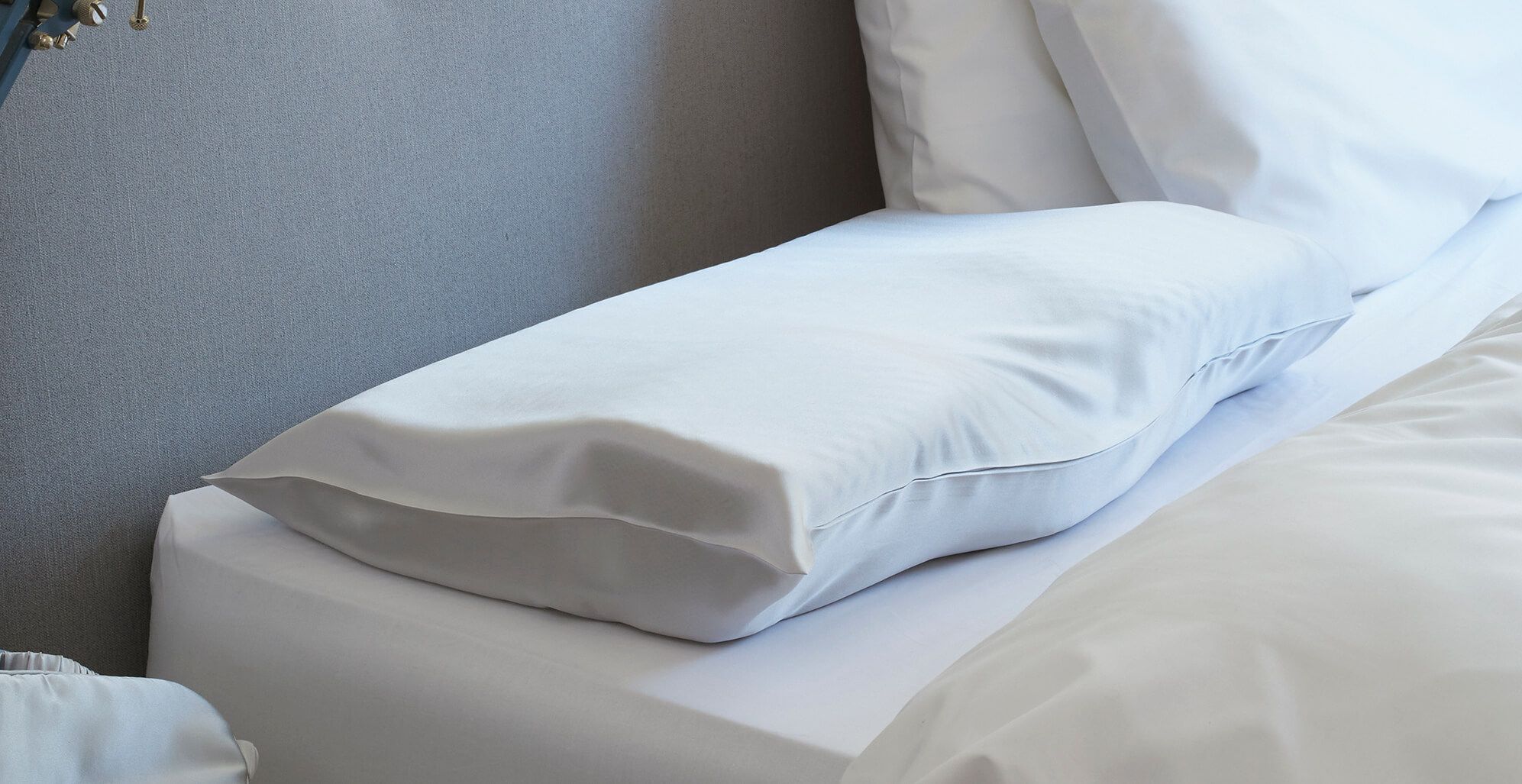How A Pillow Could Help Cure Your TMJ
Written by Dr. JoAnn Giesenhaus

Waking up with aches instantly puts you in a bad mood. But these pesky pains are even more impossible to ignore when in your jaw area.
Ready to release the pain? This blog covers everything you need to know about TMJ causes including possibly your pillow, pillows to help TMJ, and how to rid yourself of this annoying ache. Let’s dive in.
What Is TMJ Pain?
If you’ve noticed extra stress or discomfort around your neck and jaw, your TMJ (temporomandibular joint) might need a bit of relief. This joint is responsible for talking and chewing, so ensuring it’s in tip-top shape is crucial. This pain is often referred to as simply TMJ.
The structures around the TMJ heavily affect the status of your joint, and if you’re experiencing jaw pain, it’s essential to investigate what’s causing the issues.
One of the most significant factors is your neck, particularly its position when sleeping.
Yup! If you neglect your sleeping position and lack a supportive pillow, you could be accidentally causing a TMJ flare-up.
Can Sleep Position Cause TMJ?
Yes, your sleeping position can cause or aggravate TMJ pain. For example, side sleeping can leave the neck and head out of alignment, thus increasing TMJ issues. Stomach sleeping is also likely to worsen TMJ.
The best sleeping position for alleviating TMJ is on your back, leaving your neck and head in a better position with minimal pressure on your jaw.
Neck health and sleep positions are intrinsically linked. Keeping your neck healthy while sleeping will reduce TMJ pain, and the first place to start is with a supportive sleeping position.
The TMJ joint is very hard-working but needs support from a healthy neck to thrive.
When the two work together, the spine’s first few vertebrae take the excess pressure off the jaw. But if neck pain is present or there's a lack of neck support, the joints get stiff, locks out, and causes pain.
Can Your Pillow Cause Jaw Pain?
If your pillow isn’t supportive or promotes an unhealthy sleeping position, it could increase your TMJ pain.
Unfortunately, a bad pillow could be the source of your misery. Many standard pillows leave you with a misaligned spine, which can cause your neck and jaw to experience extra aches and pains.
Similarly, your pillow could be causing you to put extra pressure on your jaw — especially if you’re a side sleeper.
Of course, not everyone needs a specialised pillow, and TMJ is largely determined by sleeping position. But if you’ve started to wake up with discomfort, it might be time to explore alternative supportive options. Bye-bye, old pillow.
Shop All Memory Foam Pillows
Is No Pillow Better for TMJ?
It’s better to find a suitable pillow than to sleep without any pillow if you’re looking to reduce TMJ pain. Sleeping position is a primary factor in TMJ pain, and to reduce it, you should look for a sleeping arrangement that supports your neck and removes jaw pressure.
If you’re experimenting with sleep sans the pillow, ensure you sleep on your back. This position is the best for TMJ relief but can be hard to maintain without cushioned support.
Avoid putting any pressure on your face or jaw. Sorry, side and stomach sleepers.
You might need a supportive pillow to lessen your TMJ pain, so forget sleeping without one. If you do, you could end up with worse TMJ pain and additional neck and back aches.
The Best Pillow for TMJ
Need a TMJ solution ASAP? Then, it’s likely a new pillow could help.
Here’s how each pillow affects your jaw.
Traditional Pillows
Traditional pillows (and feather pillows) don’t necessarily worsen TMJ. However, using them in conjunction with a side or stomach sleeping position can leave you with extra pain. For the best results, attempt to remain on your back without leaning on your jaw.
Standard pillows don’t actively help TMJ pains, but if you’re militant about your sleep position, they won’t worsen the problem.
Memory Foam Pillows
Memory foam pillows offer more head and neck support and promote healthy sleeping positions. These pillows are even designed to promote spinal alignment, ensuring the TMJ joint isn’t left with extra pressure.
In addition, memory foam pillows can help correct bad sleeping habits. For example, a memory foam pillow with a cervical dip is designed to help you easily sleep on your back. Other benefits of memory foam pillows include pressure point relief, long-lasting support, and easy pillow maintenance.
When it comes to reducing TMJ, memory foam pillows with ergonomic designs, like a cervical pillow, can improve symptoms and your overall posture health.
No Pillow
Sleeping without a pillow isn’t the best option and can only help TMJ if you sleep securely on your back. However, staying completely flat on your back without support can be tricky.
Any other sleeping position can potentially worsen TMJ pain, especially without the assistance of a pillow.
The Best Pillow For TMJ: Groove Pillow

The best pillow to reduce TMJ and jaw pain is one that supports spinal alignment and removes pressure from the affected jaw area. Therefore, a cervical memory foam pillow is popular for many TMJ sufferers.
These expert pillows are designed to keep the head steady and the spine aligned, and they remove pressure from the TMJ area and various other pressure points on the head, neck, and upper back.
What is the Best Pillow Position for TMJ?
Alongside choosing a beneficial pillow, you need to position the pillow correctly to diminish TMJ effects. The key aim here is to align the head and neck while lying on your back.
If you use a standard pillow, you want to lay on your back with your head on the pillow. Don’t add extra elevation or put your hands under the pillow; this can raise your neck too high and cause strain. You want the pillow to support the natural curve of your neck.
Similarly, if you’re using a memory foam pillow, you want to lay your head on the pillow, and you want the pillow to follow your neck’s natural curve. It should also gently cradle your head rather than hold it at an angle.
Some memory foam pillows have a dip in the middle, and this is ideal for extra neck and spin support. Use the pillow’s subtle curve to guide where to place your head. Pillows with dips (AKA cervical pillows) allow your neck ligaments and muscles to relax without strain or damage.
Before using one, learn how to sleep on a memory foam pillow to ensure beneficial results.

Conclusion
TMJ pains are frustrating and can severely lower the quality of your sleep. However, you can reduce them with a healthy back sleeping position and a supportive pillow. Opt for a memory foam pillow to ensure your neck and spine are in the most beneficial place possible to remove force from your jaw.
The Original Groove Pain Relief Pillow is a memory foam pillow designed to reduce pain and improve sleep quality. With an ergonomic dip, this pillow promotes healthy back sleeping and a high level of support with every use. Read the Trustpilot reviews here.
About The Author
Dr. JoAnn Giesenhaus is a dedicated chiropractor with over 20 years of experience, committed to helping people achieve vitality and live life to the fullest.
An expert in Corrective Care Programs, utilising advanced technology like Posture Screen, Sit Screen testing, Motion Study X-Rays, Arthrostim, and Vibracussor for gentle, effective spinal adjustments.

